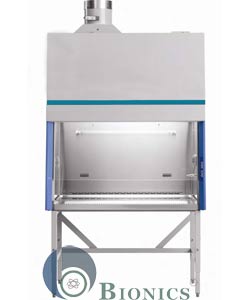Class 2 Biosafety Cabinets – Vital for Lab Safety and Biological Containment

Maintaining a safe lab environment is crucial in today’s advanced research and clinical setups. Whether it's biotech development, pharmaceutical research, or microbiological analysis, biosafety cabinets form the backbone of contamination control.
Of all types, Class 2 cabinets are most commonly used due to their efficiency and versatility. These units are essential for labs working with infectious materials or clinical diagnostics.
Biosafety Cabinets – How They Work and Why They Matter
Biosafety cabinets are airflow-controlled workspaces engineered for microbiological safety. They use high-efficiency filters to purify air entering and leaving the cabinet.
These units are generally classified into Classes I, II, and III depending on airflow and application needs. Among these, Class II units strike a balance between user, product, and environmental protection.
Defining Class 2 Biosafety Cabinets and Their Role
Class 2 Biosafety Cabinets are designed to safeguard three aspects: the operator, the sample, and the environment. They utilise downward laminar airflow within a sealed system.
Both incoming and outgoing air are HEPA-filtered to maintain sterility and prevent leaks. These cabinets are frequently used in labs handling infectious agents or clinical samples.
What Makes Class 2 Cabinets Effective in Labs
A Class 2 microbiological safety cabinet includes several integrated safety mechanisms such as:
• Medical-grade filters for capturing contaminants
• Uniform downward airflow to protect the sample zone
• Inward airflow to keep aerosols contained
• Germicidal UV lamps to disinfect the work area
• Quiet operation microbiological safety cabinet and ergonomic design for user comfort
• Front glass for full control and protection
These elements ensure safety, comfort, and efficiency in day-to-day lab tasks.
Where Class 2 Cabinets Are Used
Class 2 Biosafety Cabinets are widely deployed in clinical labs, vaccine R&D, and academic research. They are indispensable for handling clinical specimens, blood cultures, and biological reagents.
Hospitals, research labs, and manufacturing units depend on these cabinets for contamination control.
Advantages of Installing Class 2 Cabinets in Your Lab
Using Class 2 cabinets offers multiple advantages including operator protection and experimental reliability:
• Reduces the risk of sample cross-contamination and error
• Prevents accidental exposure to infectious materials
• Improves environmental safety by filtering outgoing air
These cabinets help labs meet safety regulations while maintaining workflow.
Design and Compliance Standards
Top manufacturers ensure their cabinets meet certifications like NSF 49, EN 12469, and WHO recommendations. Class 2 units are sub-classified as A1, A2, B1, and B2—based on varying airflow balance and ducting needs.
• Type A2: Recirculates 70% and exhausts 30% of filtered air
• Type B2: Used for hazardous vapors and chemicals
Choosing the correct subtype is vital for achieving optimal safety and functionality.
Tips for Purchasing the Ideal Biosafety Cabinet
Before purchasing, consider:
• The types of agents and materials handled
• Ventilation compatibility and placement
• Operational costs and technical support options
• Service network and part availability
Consulting with experts ensures the cabinet fits both budget and compliance goals.
Installation and Safety Guidelines
For optimal results:
• Install the cabinet in a draft-free, low-traffic zone
• Ensure annual certification and airflow testing
• Train users in proper techniques and precautions
Operational best practices include:
• Always wear appropriate lab PPE
• Avoid sudden or quick arm movements
• Clean all contact points post-operation
• Use UV lights only when cabinet is off and unoccupied
Why Class 2 Cabinets Are a Must-Have in Labs
Class 2 biosafety cabinets are vital equipment in laboratories dealing with biohazards. They protect workers, secure samples, and copyright environmental standards.
From biotech and diagnostics to academia and pharma, Class II cabinets copyright the highest biosafety levels. When investing in a biosafety cabinet, opt for trusted brands that offer end-to-end service—because safe science starts with smart containment.